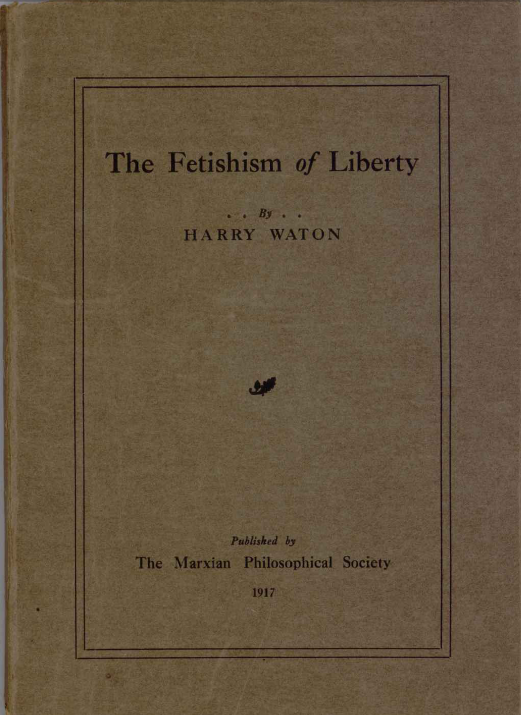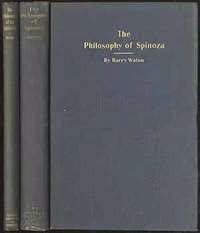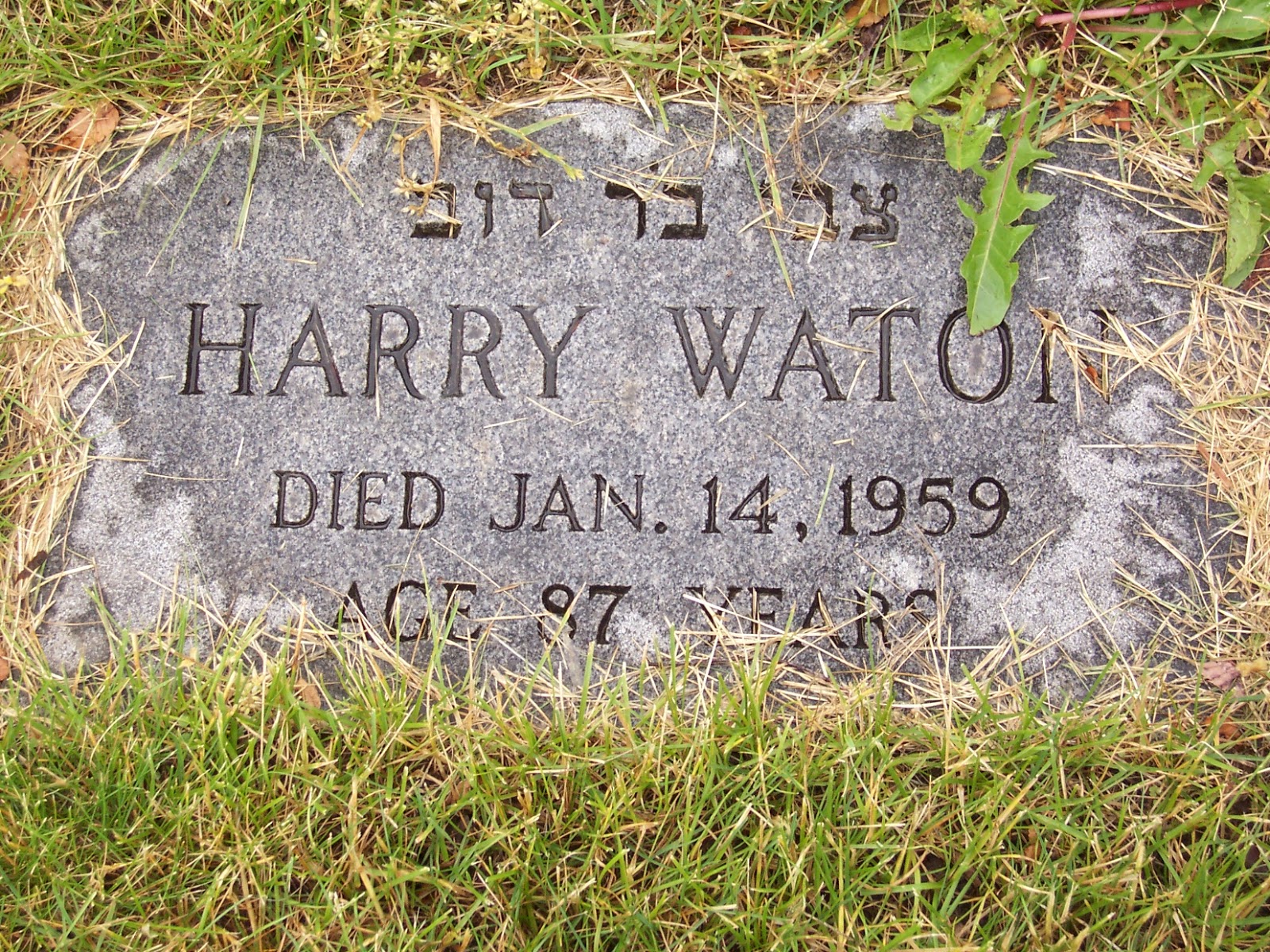Harry Waton (1871 - 1959) kabbalist, marxist, spinozist (merkwaardige -)
Dit wordt een pionier-blog over iemand van wie veel uitspraken op internet te vinden zijn (hij wordt vooral naar voren gehaald als iemand die de joodse wereldheerschappij voorstond), maar van wiens data en biografie verder niets te vinden is. Ik zal aan het eind van het blog laten zien hoe ik zijn data reconstrueerde die vanaf nu dus op internet staan.
 Harry Waton is “one of the more erratic theorists of Marxist and radical thought” - een van de meer grillige theoretici van het marxistische en radicale denken,” aldus Walter Goldwater. 1)
Harry Waton is “one of the more erratic theorists of Marxist and radical thought” - een van de meer grillige theoretici van het marxistische en radicale denken,” aldus Walter Goldwater. 1)
Ik begon voor dit blog enig onderzoek te doen daar je op internet veel aanbiedingen van herdrukken van dit boek aantreft:
Harry Waton, Kabbalah and Spinozas Philosophy as A Basis for an Idea of Universal History. New York, Spinoza Institute of America, Vol I 1931, Vol. II, 1932.
 Maar als je zijn naam op Google ingeeft krijg je veel merkwaardige citaten, die vooral zijn geput uit zijn op archive.org te vinden], zoals
Maar als je zijn naam op Google ingeeft krijg je veel merkwaardige citaten, die vooral zijn geput uit zijn op archive.org te vinden], zoals
"Since the Jews are the highest and most cultured people on earth, the Jews have a right to subordinate to themselves the rest of mankind and to be the masters over the whole earth. Now, indeed, this is the historic destiny of the Jews, but not in the sense of Hitler and the nazis. With Jesus, who only symbolizes the Jews, the Jews say: Our kingdom is not of this world. The Jews will become the masters over the whole earth and they will subordinate to themselves all nations, not by material power, not by brute force, but by light, knowledge, understanding, humanity, peace, justice and progress. Judaism is communism, internationalism, the universal brotherhood of man, the emancipation of the working class and the human society." (p. 99-100) "The Communists are against religion (Christianity), and they seek to destroy religion; yet, when we look deeper into the nature of Communism, we see that it is essential nothing else than a religion (Judaism)." (p. 138).
"The Communist soul is the soul of Judaism. Hence it follows that, just as in the Russian revolution the triumph of Communism was the triumph of Judaism, so also in the triumph of fascism will triumph Judaism." (p. 143-144).
"The Jews welcome this revolution in the Christian world, and the Jews should show an example. It is not an accident that Judaism gave birth to Marxism, and it is not an accident that the Jews readily took up Marxism: all this was in perfect accord with the progress of Judaism and the Jews." (p. 148).
Waton heeft onvoorstelbaar veel geschreven en gesproken over het jodendom in relatie tot het marxisme. Maar daarbij ook altijd impliciet en expliciet over Spinoza. Ik noem alleen nog
Harry Waton, A True Monistic Philosophy. Comprehending The Absolute, God, Existence, Man, Society, and History. Vol. I. New York, The Spinoza Institute of America. 1947. xix + 302 pp.
Harry Waton en the Spinoza Institute of America
“During the latter twenties, on December 18, 1927, a society actually was founded in New York City called the Spinoza Institute of America. It organized public lectures on Spinoza at one of which, for instance, at the Stuyvesant High School, Morris R. Cohen was the speaker, and Gabriel R. Mason the chairman. One of its grouplets under the guidance of a Marxist, Harry Waton, tried to synthesize Marx and Spinoza. The Spinoza society published irregularly for a few years a journal called The Spinoza Quarterly that enlisted brief statements from Romain Rolland, Albert Einstein, Sir Frederick Pollock, and several Harvard luminaries. The little sect took on all the traits peculiar to an association of crackpots, with a creed called "biosophy," and its creedal leader; its existence became shadowy as the years of depression ended.*) Harry Waton continued into the early 50's to give lectures at the Labor Temple under the banner of the Spinoza Institute of America; copies of them were deposited in the Archives of the New York Public Library. Waton, with an original flair, argued that Marx's historical materialism defined the physical order of things which in accordance with Spinoza's psycho-physical parallelism, had to be complemented with the historical idealism of mental realities. Cf., Harry Waton, "Why a Spinoza Institute?", in Spinoza Institute of America, Baruch Spinoza: Addresses and Messages Delivered and Read at the College of the City of New York on the Tercentary of Spinoza, November 23, 1932, New York, 1933, pp. 65-77. Harry Waton, Marxism Reconsidered: Should We Go Beyond Marx?, Brooklyn, 1940, p. 5.”
Vol. 2. Spinoza Institute of America, 1955, dat op books.google niet is in te zien, maar waaruit wel blijkt dat op zeker 37 bladzijden Spinoza voorkomt.
Lewis Samuel Feuer heeft in zijn Varieties of Scientific Experience: Emotive Aims in Scientific Hypotheses. [Transaction Publishers, 1995 - books.google] op p. 353 een uitgebreide noot met de volgende informatie:
[Toevoeging aan de oorspronkelijke tekst van het blog]
*) De heer Barrett Pashak uit Canada stuurde mij de volgende kanttekening bij deze van Lewis Samuel Feuer overgenomen informatie, die ik hierbij dankbaar overneem:
Dear Mr. Verdult: I would like to point out a point of confusion regarding the Spinoza Institute of America, which you mention in your first Waton post. You quote Lewis Samuel Feuer as follows:The little sect took on all the traits peculiar to an association of crackpots, with a creed called "biosophy," and its creedal leader.
The Biosophical Institute was established by Frederick Kettner, who had been originally an enthusiastic Brunnerian. Kettner also established an organization that he called the Spinoza Institute of America. However, according to Jurgen Stenzel, Brunner scholar and President of the Brunner Institute, Kettner’s group had nothing to do with that of Waton (Philosophie als Antimetaphysik: zum Spinozabild Constantin Brunners / Jürgen Stenzel, p. 419)It seems Feuer has conflated Waton and Kettner. I am sure he would have regarded them both as crackpots, which made it easy to confuse them, along with the fact that they gave their organizations the same name, and they were involved in the same realm of ideas. But Waton and Kettner are completely distinct, each fascinating in his own way, to be sure.
[Vervolg van het oorspronkelijke blog]Over die toespraken bij gelegenheid van die New Yorkse viering van de 300e geboortedag van Spinoza, vinden we het volgende in het 38e jaarverslag van Het Spinozahuis (1934 - 1935) [Brill, Leiden, 1935 - books.google]
“Het andere bundeltje, dat ons naar aanleiding van de in 1932 plaats gevonden Spinoza-herdenking in het afgeloopen jaar bereikte, bevat een aantal korte redenen en boodschappen, uitgesproken en voorgelezen in eene te New York door het Spinoza Institute of America georganiseerde samenkomst; de titel er van luidt Baruch Spinoza (9). Met slechts een enkel woord willen wij den inhoud der verschillende bijdragen aanstippen.” [p. 22]”Nog trad Harry Waton in eene beschouwing over The historic significance of Spinoza's philosophy, waaromtrent hij verklaarde, dat Spinoza de eerste mensch was geweest na Mozes, die God van aangezicht tot aangezicht had aanschouwd en wien het gegeven was der menschheid in duidelijke woorden de kennis te ontvouwen, welke hem door den Absolute was toevertrouwd. Mocht daarom Spinoza's philosophie worden een lamp voor de voet en een licht op het pad der menschen!” [p. 23]
”Aan het onderwerpelijk bundeltje zijn alsnog twee essays toegevoegd. In het eerste, handelende over The Jewish question in Spinoza's philosophy, betoogt Harry Waton de voortreffelijkheid van het Judaïsme, door de verwerkelijking waarvan alle vraagstukken van het menschelijk geslacht zouden worden opgelost. Wanneer Spinoza's wijsbegerete, die in wezen geheel Joodsch zou zijn, alom zal worden aanvaard, dan zal er, naar Harry Waton vastelijk gelooft, ook geen Joodsche quaestie meer bestaan. Het andere essay, getiteld Free wilt or determinism is van de hand van Walter Bernard, die, gelijk van zelf spreekt, de vrije wil ontkennend…” [p. 24]Om het beeld van deze merkwaardige man verder in te kleuren hier nog iets over zijn
 Harry Waton, The Fetishism of Liberty [New York: Marxian Philosophical Society, I9I7. Pp. vii+I01] Hiervan is een PDF op internet gebracht.
Harry Waton, The Fetishism of Liberty [New York: Marxian Philosophical Society, I9I7. Pp. vii+I01] Hiervan is een PDF op internet gebracht.
De Journal of Political Economy, [Vol. 26, No. 6 (Jun., 1918), p. 672] gaf daarvan deze bespreking:
"Is not your iconoclast at bottom a devout worshiper? A Marxian socialist declares liberty to be "one of the most dangerous idols worshiped by the people of this century," and thereupon justifies his faith in socialism because it is in harmony with that tendency of the cosmic process of evolution-universal freedom. As the patron saint sought to destroy the fetishism of commodities and humanize them, the humble follower attacks the fetishism of liberty and seeks to socialize it. Both are worshipers of capitalism and liberty still. We start with the familiar conflict between the individual or group with inherited anti-social impulses and society with its legal and customary restraints. The socialist outdoes Spencer here. Then comes the happy ending, where the individual is completely socialized and conflict is no more. This is true to Marxian prophecy, "We feel in a state of liberty when we can gratify our needs and desires." The individual is not and cannot be free until he seeks the social good. The tendency of social evolution is toward a state of ever-increasing constraint of the anti-social impulses of the individual. Hence, only as we seek the satisfaction of our social nature do we find freedom and happiness. For- tunately the conditions of life make for pro-sociality and individual well-being at the same time. The essay has certain faults. It abounds in contradictions, perhaps because terms are loosely used; the thread of the argument does not unroll singly and continuously; and generalizations are not always supported by data. And yet there is such sound truth in its emphasis upon the true uses of liberty and the opportunity to satisfy one's social needs and desires that all else may be forgotten."
* * *
Hij heeft ook contact gezocht met Albert Einstein. Het Einstein Archief geeft daarover:Prof. Albert Einstein and Harry Waton: In a discussion of "A Solution of the Ultimate Problem of Existence" 1942-03-18 [hier]
...IT WILL BE A PLEASURE FOR ME TO TRY TO HELP MR, WATON.... Einstein in een brief 1942-02-27 aan Louis Reinhardt. [hier]
Eerder schreef Einstein ook "To try to help a man is one thing; to take his ideas seriously is another thing." Maar of dat sloeg op Harry Waton weet ik niet; het komt uit een brief die Einstein 1941-04-07 schreef aan William Francis Gray Swann, Bartol Research Foundation of the Franklin Institute. [hier] Maar waarom zou dit niet ook op Waton slaan?
* * *
 Wie nu nog diens boek wil aanschaffen [Harry Waton, Kabbalah and Spinozas Philosophy as A Basis for an Idea of Universal History] moet het uiteraard zelf maar weten..., maar ís gewaarschuwd.
Wie nu nog diens boek wil aanschaffen [Harry Waton, Kabbalah and Spinozas Philosophy as A Basis for an Idea of Universal History] moet het uiteraard zelf maar weten..., maar ís gewaarschuwd.
Cf. antiquarisch aanbod: Harry WATON, The Kabbalah and Spinoza's Philosophy as a Basis for an Idea of Universal History. Book One: The Philosophy of the Kabbalah & Book Two: The Philosophy of Spinoza. New York: Spinoza Institute of America, 1931, 1932
* * *
Zie een tweede blog
___________
1) RADICAL PERIODICALS IN AMERICA 1890-1950: A BIBLIOGRAPHY WITH BRIEF NOTES by WALTER GOLDWATER In: The Yale University Library Gazette, Vol. 37, No. 4 (April 1963), pp. 133-177]

Ik meld nog even, zonder naar enige volledigheid te streven, dat hij ook veel over Marx en marxisme schreef. Zo
• Harry Waton, The Philosophy of Marx. Marx Institute, 1921 - 268 pages
Voorts zijn zeker nog vermeldenswaard:
• Harry Waton, The Philosophy and Ethics of Spinoza. Spinoza Institute of America, 1935
• Harry Waton, The Philosophy of Spinoza and Universal Philosophy: Absoute, Infinite, and Eternal. Spinoza Institute of America, 1938
• Harry Waton, "Freedom and Constraint": Eighth Lecture. Spinoza Institute of America, 1951 - 22 pages
De afbeelding van Waton heb ik van deze site van iemand die het marxistische nieuwsblad The New York Call doorzocht en daar in de krant van 11 november 1917 zijn foto aantrof. Hij was toen 46 jaar.

Op het Mount Ararat Cemetery [Farmingdale, Suffolk County, New York, USA] is deze grafzerk van Harry Waton die op 87-jarige leeftijd op 14 januari 1959 overleed. Met name ook door het Hebreeuws bovenaan, moet het wel om 'onze' Waton gaan. Ik reken terug dat hij in 1871 geboren moet zijn (de kans dat het 1872 was, is heel klein; slechts 4%). [Foto en informatie van hier]
In The New York Times, 15 Jan 1959 in een lijst van overledenen: Beloved husband of the late Rosa, devoted uncle of Milton and Eta Newman, Sylvia Shore and Lillian Leon. Services, Friday 10 A.M. "The Riverside," Far Rockaway, L/I.Volgens de U.S. Naturalization Record Indexes, 1791-1992 is Harry Waton in 1871 in Rusland geboren, in 1891 in de V.S. van Amerika aangekomen en verkreeg hij op 18 juli 1896 het Amerikaans staatsburgerschap. Hij verbleef toen in New York [hier]



Reacties
Hierbij meld ik dat ik midden in het blog een kanttekening toevoegde die de heer Barrett Pashak uit Canada mij toezond.
Stan Verdult 04-07-2013 @ 22:30